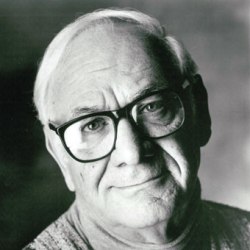
Dominick Argento by Tom Berthiaume
"I think that music…began as an emotional language. For me, all music begins where speech stops."
- Dominick Argento (1927–2019) quoted by his publisher Boosey & Hawkes
Dominick Argento was best known for his operas. Postcard from Morocco, Miss Havisham's Wedding Night and Casanova's Homecoming got some attention when they debuted in the 70s and 80s, as did the song cycle/solo opera From the Diary of Virginia Woolf, and these works are still revived occasionally by universities and regional companies. They're what I consider traditional operas in the sense that they're suitable for a conventional opera company, such as the Met, Seattle Opera, etc., by contrast with works like Einstein on the Beach or Civilization and Its Discontents that were called operas by their creators but don't use full-throated classical opera singing or standard orchestras. Most of Argento's operas are quite conservative in their musical style, though not as backward looking as Menotti, Hoiby, Floyd and that particular lineage of Americanized verismo.
The fraught life of homegrown traditional opera in American music history is its own topic, with the impoverished state of institutional arts support here (compared to Europe or East Asia) often cited as a factor. Probably just as important is that we didn't inherit the genre from the British, who instead supplied us with the operetta tradition (that reached its apogee in Gilbert and Sullivan) that fed the stream which turned into Broadway musicals. And then there's the American penchant for transgressive art—we just generally make better music when we're tweaking the established order rather than trying to ride on its coattails (there's a reason why Schoenberg and Britten were European while Ives and Jelly Roll Morton were American).
Not too many traditional American operas have made much impact outside the New World. Porgy and Bess is one, but it's unique. Otherwise Menotti and Adams are almost alone in having received sustained attention from European companies (and of course Menotti lived in Europe at the beginning and end of his life). The only other American to crack Operabase's list of 100 most played opera composers from 2004 to 2018 is Jake Heggie (a bit of a surprise there). But compare that meager footprint to the global and ongoing influence of US-incubated traditions like multimedia, new music theater, and ritualized solo and chamber performance.
All of which I suppose augurs inauspiciously for the longer term legacy of most of Argento's work. But there's one gem that for me has always stood out both musically and dramatically: his one-act opera A Water Bird Talk (1975–6), whose libretto he adapted from Chekhov. The sole singing character is a baritone delivering a Victorian era lecture on aquatic birds, but in the expressionist tradition his delivery (occasionally accompanied by the coughing of his domineering wife) gradually becomes more and more unhinged. I think of it as a kinder, gentler Erwartung, or perhaps a genteel Eight Songs for a Mad King. It's definitely one of Argento's most intriguing and modern-sounding works. Here it is from 2018's Odyssey Opera album, which also includes Miss Havisham's Wedding Night and The Boor, and was one of my Sequenza21.com picks for that year.
- Michael Schell (first published upon Argento's death, February 20, 2019)
![]()
Selected writings |
Schellsburg home
Jerry Hunt |
cribbage
![]()
Original Material and HTML Coding Copyright © 2019–21 by Michael Schell. All Rights Reserved.